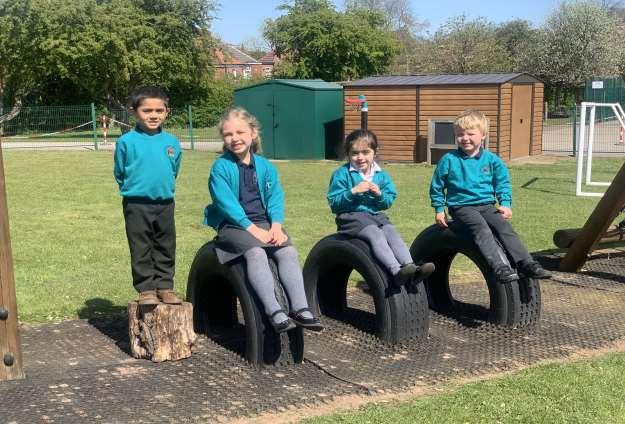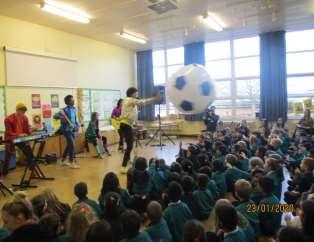
9 minute read
The Curriculum
from Prospectus 2021
Curriculum
Core Subjects
Advertisement
English – Spoken Language; Reading; Writing; Spelling, Punctuation & Grammar Maths – Number; Shape, Space and Measure
Science
The National Curriculum is taught at Sitwell Infant School in Year 1 and 2. Our teachers work hard to ensure the curriculum is as stimulating and exciting as possible, so that the children enjoy learning and are inspired to become lifelong learners. We build in many links with the local area and take the children on a variety of educational visits, to excite and interest them in their learning and to create a real life context to learning. Our aim is to deliver our creative curriculum in a cross curricular way. Within each theme of work maximum opportunity will be taken to integrate cross curricular links, with literacy and numeracy at the core. Our creative curriculum has 4 ‘drivers’, which are constantly considered when deciding how and what we teach. Lifelong Learning and Skills (Maths, English, Computing) Community & Environment (Science, Geography, History, Global Dimension) Healthy Lifestyles (PE, PSHE and RE) Creativity (Music, Drama, DT and Art)
CURRICULUM MEETINGS FOR PARENTS
We hold regular curriculum meetings, during the daytime and evening, for parents to attend to give you the opportunity to find out how we teach different subjects; meet the teachers and gain advice about how to support your children’s learning at home.
English
At Sitwell Infant School, English is taught in an exciting, stimulating and enjoyable way. There are 4 main elements to the English curriculum - Spoken Language, Reading, Writing and Spelling, Punctuation & Grammar (SPaG). English at Sitwell Infants is taught mostly through a cross curricular approach but some elements need to be taught separately. Staff in school are highly trained to support children learning English as an Additional Language, using a range of strategies and resources.
Speaking and Listening
Development of children’s speaking and listening skills are vital, particularly in their early years. At Sitwell Infant School, children develop a love of listening to stories and poems, saying rhymes, as well as participating in drama and role play – all of which help to develop their listening and speaking skills. They become confident, fluent and articulate, and very able to express themselves. We encourage all children to be interested in other people’s thoughts and feelings, ideas and opinions, and value and respect them.
Writing
Much of the writing at Sitwell Infants is cross-curricular in nature covering a range of genres, giving children a real purpose and context in which to write. Writing can be produced individually, as a pair or in groups with a range of inspirations to reflect the wide variety of reasons to write in everyday life. Attention to grammar, punctuation and spelling is thorough within the daily Literacy session but specific aspects are taught separately, where appropriate.
Reading
At Sitwell Infant School we are committed to providing a rich and comprehensive reading programme, offering a range of opportunities to become fluent, enthusiastic readers. A wide range of reading experiences is offered through the Literacy lesson and during continuous provision.
Phonics Phonics forms the daily basis of reading development in EYFS and KS1 and this approach to teaching reading is taught daily in every class. Phonically decodable reading books, as well as simple fiction and non-fiction books, are used to support children’s early reading skills within school.
Individual and Guided Reading Individual and guided reading usually takes place twice a week. Children read individually or within a group with others of similar reading ability. The book is specially chosen to match the reading ability of the child or group. During the session, we teach appropriate reading strategies or skills to support children’s decoding and understanding of a text. Guided reading provides opportunities for children to take part in discussion where they can enthuse and learn from each other.
Home/School Partnership We really value and appreciate the time parents spend reading with their children at home. This is vital for developing fluency and establishing a good reading habit and a love of books. We hold regular workshops and shared reading sessions throughout the school year to promote reading for pleasure.
Maths
At Sitwell Infant School, we inspire all children to become confident and enthusiastic mathematicians, who are willing to take risks and are not scared of making mistakes. We teach children that an important aspect of their development is to learn from their mistakes. We aim to develop a range of mathematical skills and provide opportunities for their application in meaningful, real-life situations. We strive to provide our children with exciting and challenging investigations, thereby increasing motivation and promoting a positive response to mathematics. For more information regarding our maths curriculum, please visit the Curriculum section of our website, www.sitwellinfantschool.co.uk.
Science
Science is taught every half term, normally through topic work, so that we cover the Science National Curriculum. Each year group has science units of study that will be covered in depth. The development of children’s experimental and investigative skills is of vital importance. Children are encouraged to be independent and collaborative scientific investigators by their involvement in exciting practical investigations. Investigative work takes the form of modelled and independent investigations and the proportion of these skills varies between year groups. The new curriculum also recognises the importance of a developing knowledge of scientific concepts. Our lessons incorporate both knowledge and investigative skills through a lively and creative curriculum.
Curriculum
Foundation Subjects
Art, Design and Technology, Computing, Music, Geography, History, Physical Education, Religious Education and PSHE
Art
Art is a useful means of expression, and is linked with many other areas of the curriculum. All children have experience in using a variety of media including paint, pastel, clay, fabrics and sewing. They produce both 2D and 3D work. During art lessons, children are encouraged to talk about their observations, so developing their use of language. They study work by famous artists and imitate those styles in their own work. We also encourage the children to identify art in the local environment, and value each other’s work. We believe strongly in children working from first hand experience, so make use of many artefacts, visits and natural objects.
Design & Technology
Children learn how to think imaginatively, and talk about what they like and dislike when designing and making. They build on the experience gained in the Early Years through investigation and play. They explore how familiar things are designed and how they work. They talk about, draw and model their ideas. The children learn how to use tools safely, to use ICT as part of their designing and making and to consider the health and safety aspects of food technology.
Computing
Computing is a new aspect of the Primary National Curriculum, where children develop an understanding of computer science as well as equipping them with the skills to use a range of Information and Communication Technologies to create programs, write texts and store information.
Technology is used to enhance the teaching and learning across the curriculum and to motivate and engage the children at every possible opportunity. Each classroom is equipped with computers and a state of the art interactive touch screen which will further develop the children’s computer expertise. We have a large amount of laptops and Google Chromebooks, which are used to teach computer skills and applications to whole class groups or small groups. We also have a large amount of iPads which are used in the classrooms on a daily basis, as well as digital cameras to support the children’s learning.
Music
From an early age children experience music in various forms; for example nursery rhymes, background music, songs and games. At Sitwell Infants we aim to nurture and build on these experiences in order to develop an understanding and enjoyment of music. Children are given opportunities to sing, play a variety of simple percussion instruments, explore sounds, compose, perform and listen to music from a range of times and cultures. Children perform in school several times throughout the school year, and also take part in singing for the wider community at various events.
Geography & History
At Sitwell Infants we aim to develop a secure understanding and awareness of chronology and the passing of time. We want the children to understand local, national and world events from the past which have had an impact on their lives. We do this by carefully planning topics securing coverage of the new National Curriculum. We want to develop the children’s geographical vocabulary and their vocabulary related to the passing of time to ensure the appropriate use of historical terms. The children will study the lives of significant men and women in the past who have contributed to national and international achievements and discuss changes that have happened over a period of time.
The children explore why people did things, research causes and make links between events: begin to explore bias and historical interpretation. The children will have opportunities to explore and question a range of primary and secondary historical and geographical sources and develop their skills of organisation, communication and representation. The children also gain historical perspective by placing their growing knowledge into different contexts undertaking studies about the British values of democracy, individual liberty, the rule of law, mutual respect and tolerance of other faiths and beliefs.
We ignite the children’s interests in the world around us and deepen their understanding of the past by arranging historical and geographical educational visits and visitors allowing access to high quality first hand experiences which help them with their topic based learning.
Physical Education
At Sitwell Infants, we believe that all children should be given the opportunity to take part in regular, high quality P.E lessons. To ensure this, all classes receive at least 2 hours of P.E. per week; one of which is outside (weather permitting), with other lessons delivered in the hall. Teachers structure P.E lessons as they would any other lesson with appropriate questioning, challenge and support given to the children.
During indoor P.E sessions, the focus is on movement/dance and gymnastic activities. During outdoor P.E sessions, the children take part in a range of invasion games, striking and fielding games, net/wall games and outdoor adventurous activities. One lesson each week is led by an experienced sports coach; this helps us to ensure that children have the opportunity to experience high quality P.E lessons with good outcomes for all children participating.
Religious Education
In our multicultural school, religious education cannot be separated from children’s learning about life in general, their environment and their relationships with others. We encourage our children to care for and respect the work, feelings, faiths and possessions of other people, and we hope that the ordering of our school life will lead to co-operation and friendship with each other.
Through assemblies, stories, visits and visiting speakers, children develop a deeper appreciation of the spiritual, moral and natural world around them.





